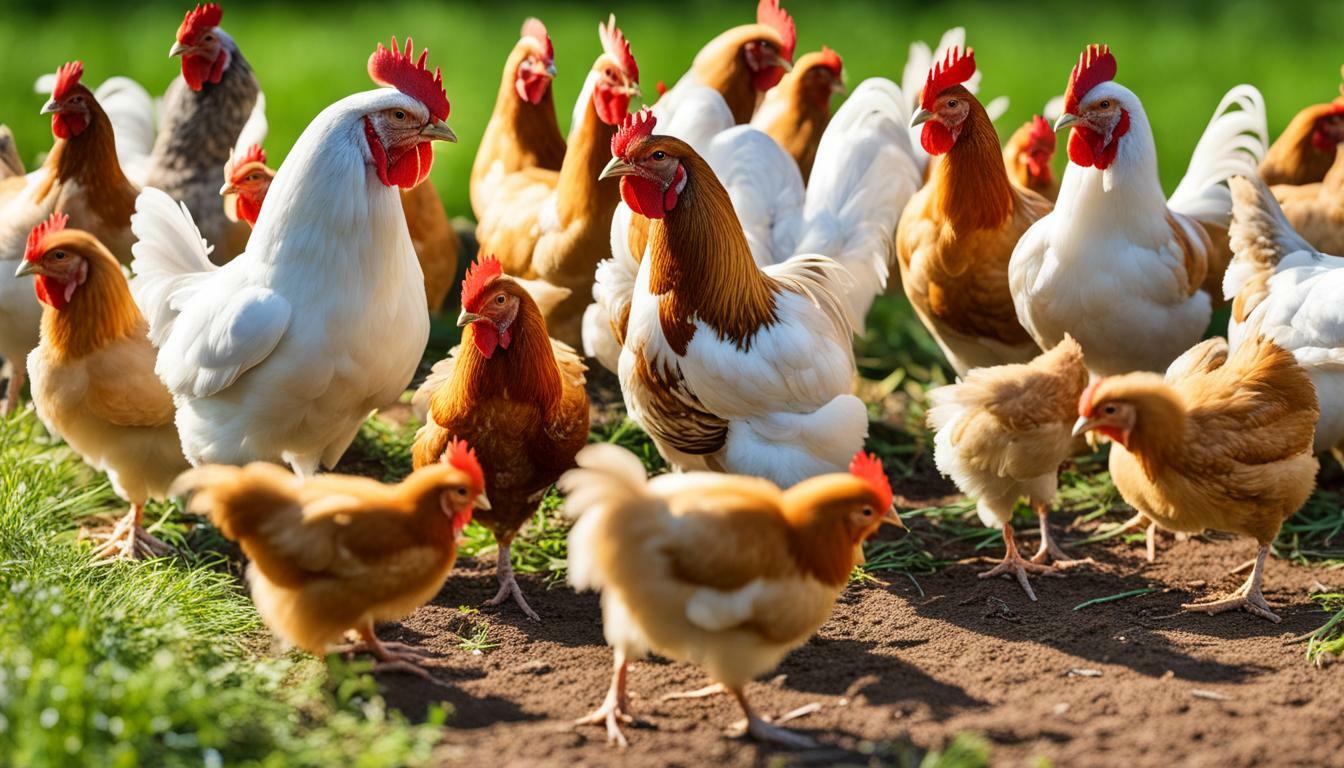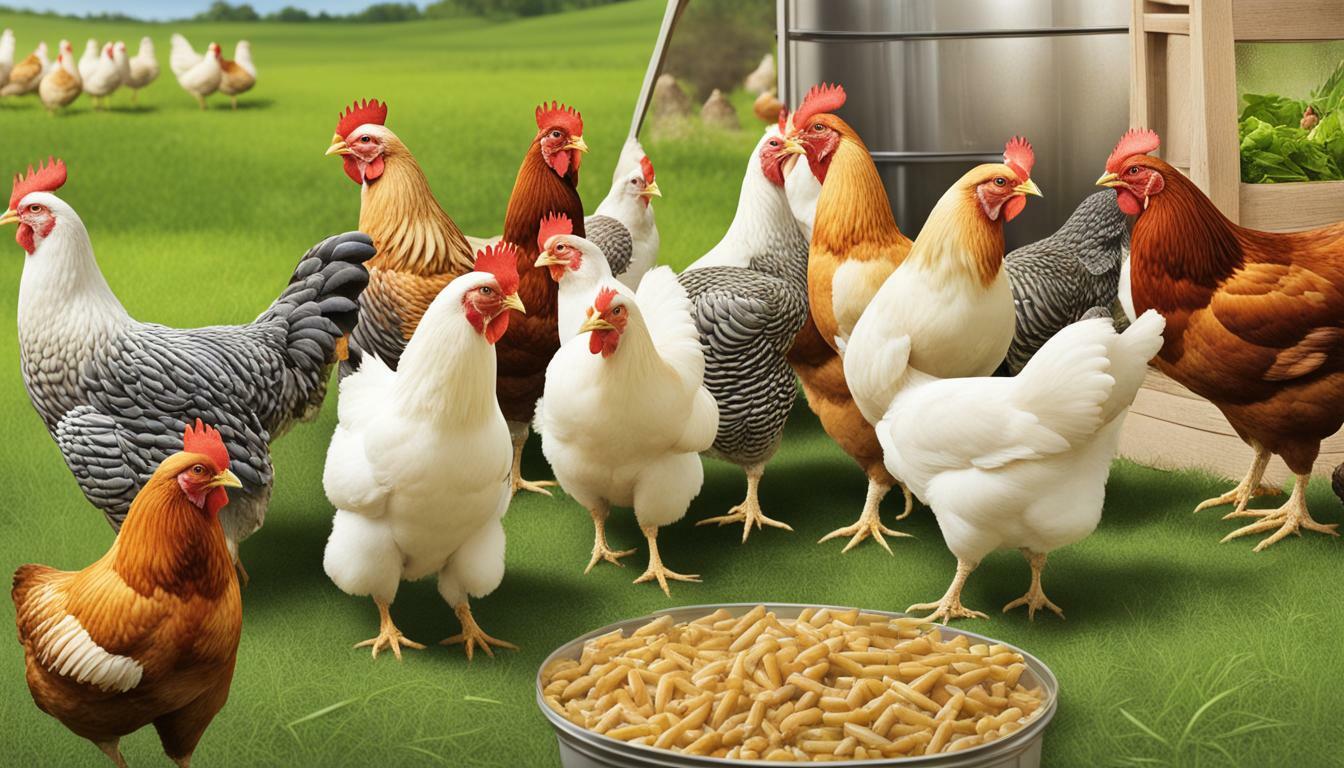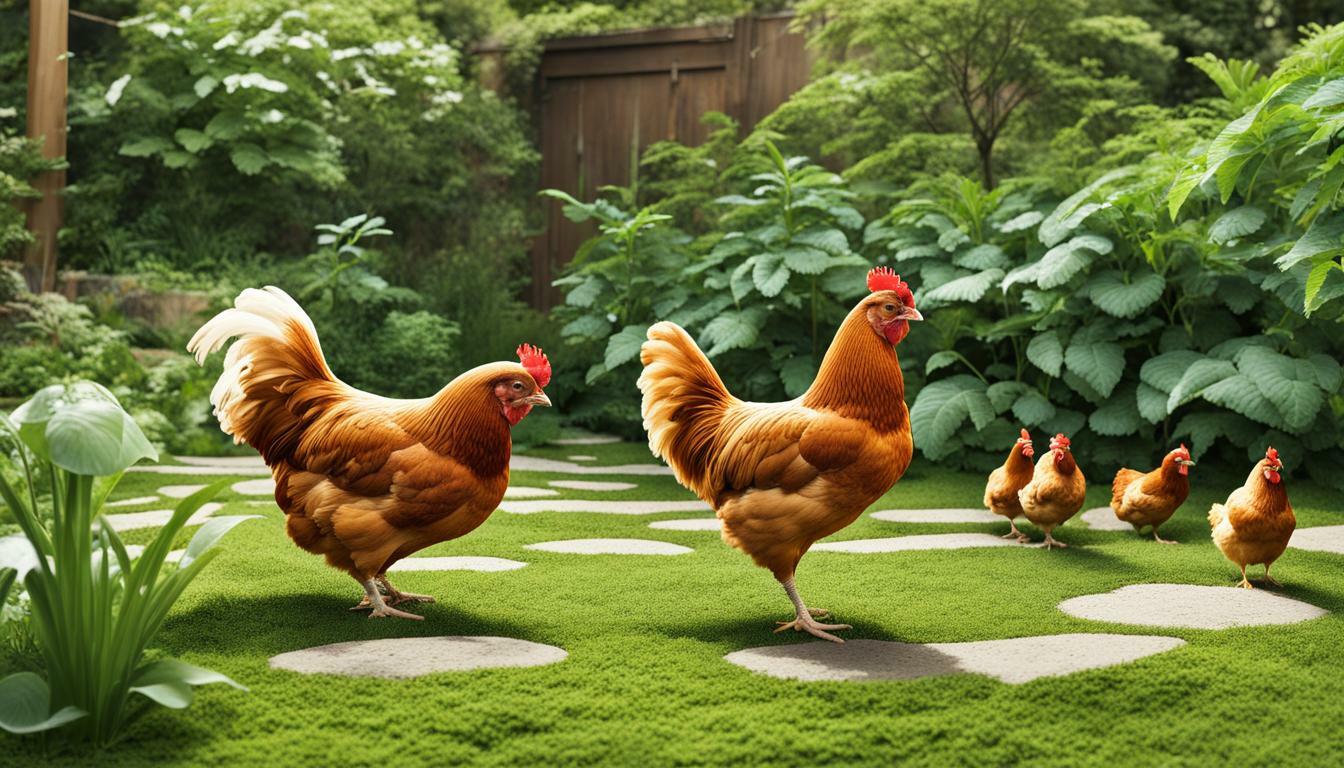Do Chickens Eat Basil? Benefits and Feeding Tips for Flocks
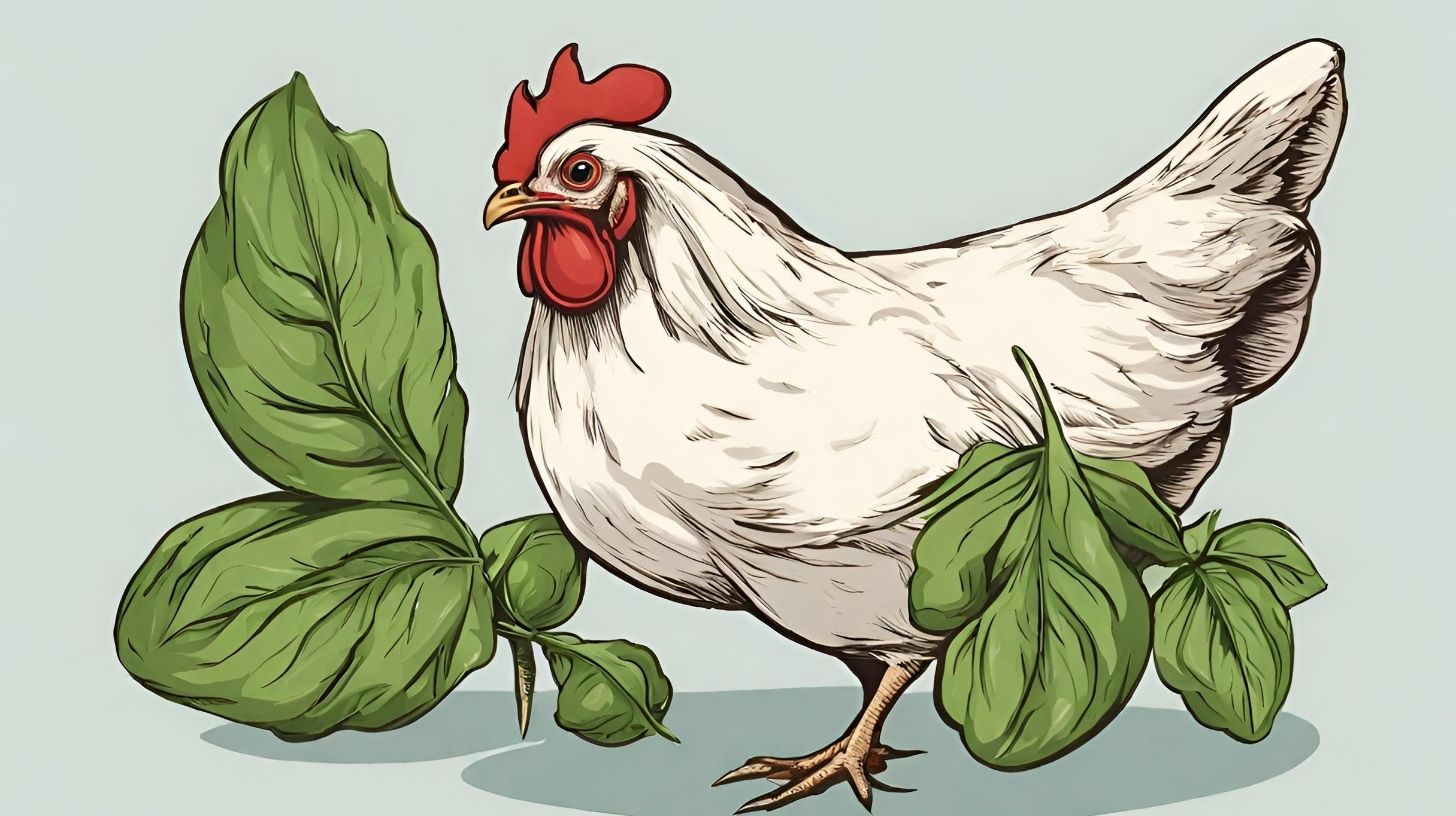
Table of content:
- Is Basil Good for Chickens? Benefits of Feeding Basil to Chickens
- Is Basil Poisonous to Chickens?
- Do Chickens Like Basil Leaves?
- How Much Basil Can Chickens Eat?
- How Often Should You Give Chickens Basil?
- Do Chickens Eat Basil Flowers?
- Can Chickens Eat Pesto with Basil?
- What Herbs Can Chickens Eat?
- Growing Basil Around Chickens: Benefits and Tips
- FAQs About Feeding Basil to Chickens
- Conclusion
Do Chickens Eat Basil? Basil is an excellent addition to any flock’s diet when fed in moderation. All parts of the basil plant, including the leaves, flowers, stems and seeds are edible for chickens. It provides essential nutrients like vitamin K, vitamin A, calcium, and antioxidants. Basil also has a delicious, aromatic flavor that chickens love.
Key Takeaways:
- Basil is a safe and beneficial herb for chickens to eat in moderation. It provides nutrients and can help repel pests.
- Chickens enjoy the taste of basil and will eat fresh leaves, flowers, and stems from basil plants. Dried basil can also be fed.
- Feed basil to chickens by hanging leaves in their run, allowing access to basil plants, or mixing dried basil into feed. Limit to a few leaves per chicken daily.
- Basil may boost egg production and quality due to nutrients like vitamin K, beta-carotene, and antioxidants. More research is needed.
- Growing basil near chickens can deter pests like mosquitos and flea beetles in a symbiotic planting relationship.
While basil has many benefits, it should still be fed conservatively as too much of any one food item can cause nutritional imbalances. Follow the feeding guidelines below to safely incorporate this nutritious herb into your chickens’ diet.
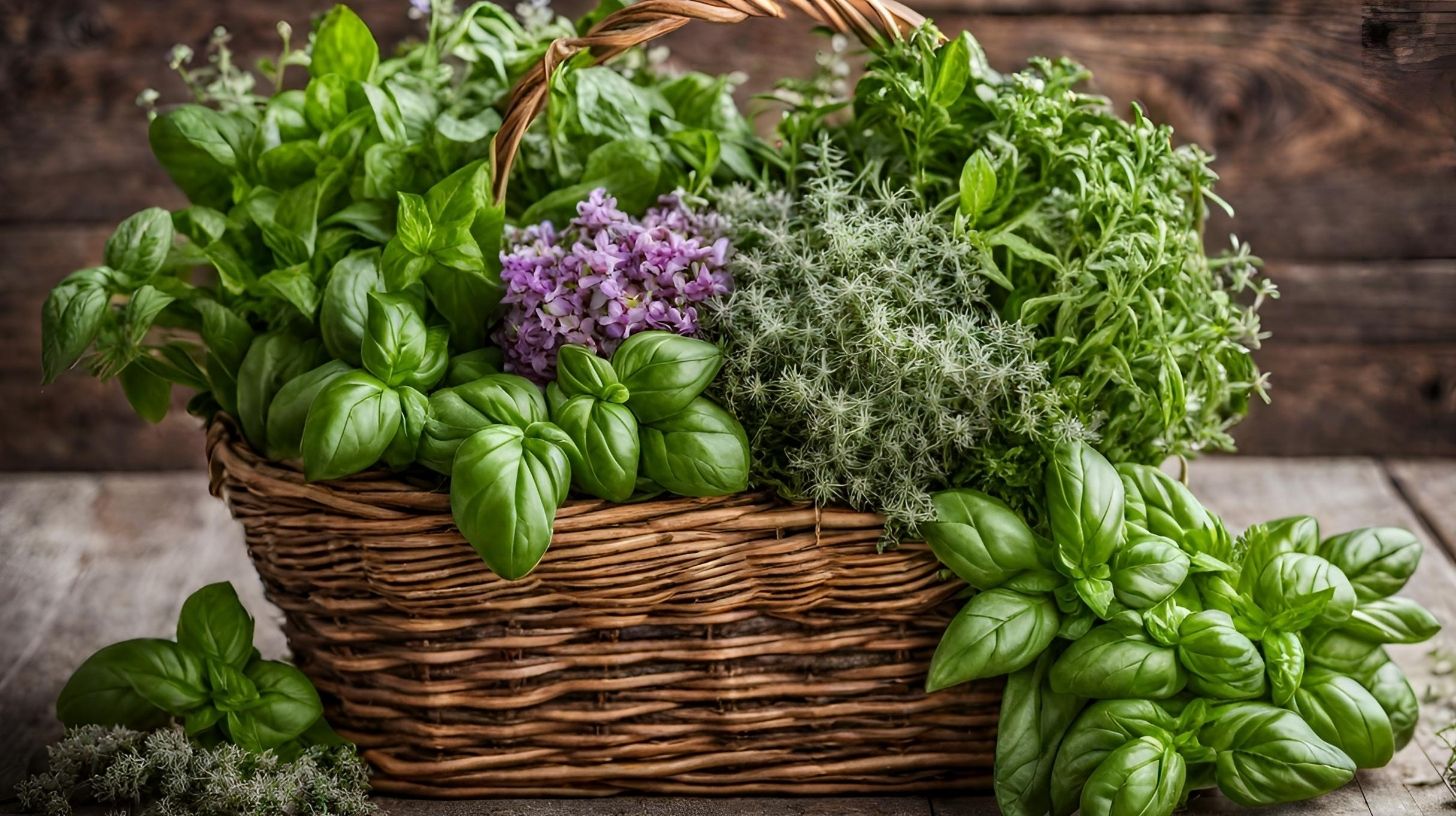 Is Basil Good for Chickens? Benefits of Feeding Basil to Chickens
Is Basil Good for Chickens? Benefits of Feeding Basil to Chickens
Here are some of the main benefits of feeding basil to chickens:
- Nutrition: Basil provides vitamin K, vitamin A, beta-carotene, antioxidants, calcium, and small amounts of protein. These nutrients can support bone and egg health.
- Pest Repellent: The strong scent of basil can help repel mosquitos, flea beetles, and other insects. Planting it near chickens forms a symbiotic pest control relationship.
- Flavor: Chickens enjoy the taste of fresh basil. The flavor infuses into eggs when chickens eat it.
- Variety: Basil adds diversity to a chicken’s diet which promotes good gut health.
- Egg Boost: Some chicken keepers report increased egg production and quality when feeding basil regularly. More research is needed.
Is Basil Poisonous to Chickens?
No, basil is not poisonous or toxic for chickens when fed in moderation. All parts of the basil plant, including the leaves, stems, flowers, and seeds can be safely eaten by chickens with no ill effects.
Some essential oils extracted from basil can be toxic at high doses, but chickens eating fresh or dried basil do not ingest concentrated essential oils. Overall, basil is very safe for chickens with minimal risks as long as they don’t consume extremely large quantities of the herb that could cause toxicity through nutrient imbalances.
Do Chickens Like Basil Leaves?
Chickens enjoy eating basil leaves and will readily forage on basil plants if given access. The aromatic flavor and variety that basil provides seem to make it a prized treat for many backyard chickens.
If you have basil plants in your garden or in pots, watch to see if your flock nibbles on the leaves when roaming. Chickens that enjoy basil will often devour leaves and small stems right off the plant.
To encourage chickens to eat more basil, hang freshly picked leaves inside their coop or run. You can also dry basil leaves and crumble them on top of feed. Offering basil-flavored treats is another way to see if your chickens like this beneficial herb.
How Much Basil Can Chickens Eat?
Chickens can eat various amounts of basil depending on their size and diet. Follow these feeding guidelines for incorporating basil according to flock needs:
- Free-ranging flocks – Allow free-ranging chickens to graze on basil plants at will or provide a handful of fresh basil leaves per chicken daily.
- Confined flocks – For chickens that don’t forage, offer around 2-3 fresh basil leaves per chicken per day.
- Dried basil – Mix dried basil at 1-2 teaspoons per pound of feed a few times per week.
- Scraps – When making pesto or other recipes with basil, chickens can eat the leftover leaves, stems, and flowers as treats.
- Moderation – Regardless of rearing conditions, basil should make up only a small part of a chicken’s diet. Overfeeding can cause nutritional imbalance.
Monitor to see if your chickens readily consume the amount of basil provided or lose interest so you can adjust quantities as needed. Smaller bantam chicken breeds and chicks should eat less than full-sized chickens.
How Often Should You Give Chickens Basil?
For confined chickens that don’t forage, aim to feed basil 2-4 times per week. Free-range flocks that graze on basil plants will regulate their own intake.
Here are some feeding frequency guidelines depending on how you offer basil:
- Fresh basil leaves – 2-3 times per week
- Dried basil mixed into feed – 2-4 times per week
- Basil plants for foraging – Daily, free choice
- Scraps from basil products – 1-2 times per week
Observe your flock to see if the amount being consumed seems correct as chickens will regulate themselves when given continuous access to fresh plants. Growing basil inside the run also allows chickens to nibble as desired.
Rotate basil with other nutritious herbs like oregano, thyme, and parsley for variety. Having a diverse mix of plants and foods to graze on is ideal for chicken health and productivity. If you notice decreased intake of basil over time, reduce frequency to avoid waste.
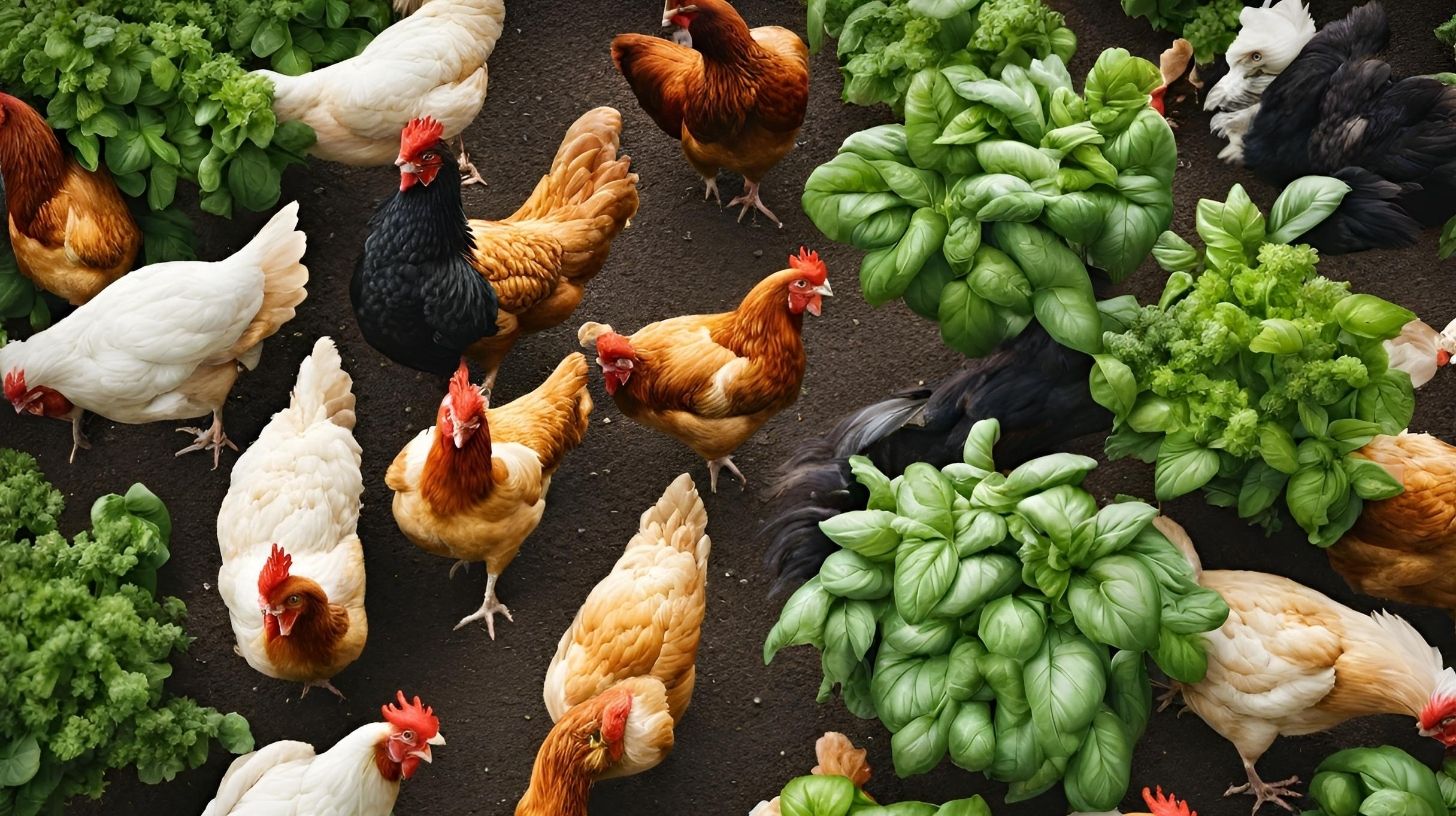 Do Chickens Eat Basil Flowers?
Do Chickens Eat Basil Flowers?
Yes, chickens can safely eat basil flowers. The blooms provide the same nutrients, vitamin A, antioxidants, and phytochemicals as the leaves and stems.
To offer basil flowers:
- Allow free-range chickens to forage on blooming basil plants.
- Pick flowers and hang bundles inside the coop or run for confined chickens.
- Mix dried basil flowers into feed or serve on top.
- Place fresh blooms in treat balls or scattering feeders.
The mild, sweet flavor of basil flowers seems to be popular with many backyard chickens. Remember to feed flower petals in moderation along with the rest of the basil plant.
Can Chickens Eat Pesto with Basil?
Chickens can eat leftover pesto or pesto-flavored pasta as an occasional treat. Basil pesto is safe and healthy for chickens in small amounts since it provides nutrient-dense ingredients like basil, garlic, olive oil, nuts, and parmesan cheese.
A few precautions to take when feeding pesto to chickens include:
- Avoid pesto containing excess salt, spices, or pungent flavors.
- Feed only leftover pesto, not chickens’ main food source.
- Offer in very limited quantities of 1-2 teaspoons per chicken as high fat foods can cause illness if overeaten.
Small portions of pesto pasta added to their feed a couple times a month provide a zesty, nutritious boost chickens will enjoy. Just be sure they don’t fill up on pasta alone which is low in balanced nutrition.
What Herbs Can Chickens Eat?
In addition to basil, chickens can eat a wide variety of healthful herbs. Some of the best herbs to grow for chickens include:
- Oregano – Rich in antioxidants to boost immunity. Deters insects.
- Thyme – Supports respiratory health. Provides vitamin C.
- Parsley – Freshens breath and boosts digestion.
- Cilantro – Helps flush toxins from the body.
- Lavender – Aids in relaxation and repels flying insects.
- Garlic – Natural antibacterial and antimicrobial properties.
- Echinacea – Anti-inflammatory and immune-boosting.
Herbs are most frequently fed to chickens fresh or dried, used in small amounts to add nutrition and flavor variety. Offer a rotating mix of herbs from the garden to delight your flock’s palate and keep them healthy.
Growing Basil Around Chickens: Benefits and Tips
Interplanting basil near or inside chicken coops provides benefits for both the chickens and plants. Here are some advantages and tips for integrating basil into a symbiotic planting scheme:
- Pest control – The strong scent of basil can help deter insect pests like mosquitos, aphids, spider mites, and flea beetles that may also attack chickens and other plants in the garden.
- Foraging – Chickens will be able to graze freely on the basil, enjoying it fresh off the vine. Less time and effort is needed to harvest basil to feed confined chickens.
- Fertilizing – As chickens scratch near basil, they will work chicken manure into the soil as a natural fertilizer. Their grazing also prunes the basil for continuous growth.
- Shade – A basil hedge around the run provides shade and cooling relief for chickens on hot days. Interplant basil near structures to maximize shade coverage.
- Variety – Having a fresh salad bar of herbs, greens and edible flowers growing in their foraging area provides nutrition diversity.
When planting basil for chickens, go for compact bushy varieties like Spicy Globe. Use raised beds for better access and to prevent chickens from digging up roots. Cut back on nitrogen-rich fertilizers since chicken manure will provide nutrients.
FAQs About Feeding Basil to Chickens
Can I give my chickens dried basil instead of fresh?
Yes, dried basil leaves or powder can be fed to chickens instead of fresh basil. Dried basil contains the same beneficial nutrients and flavors as fresh, condensed into a more convenient form with a longer shelf life. Slowly introduce it mixed into feed to observe if your flock likes the taste.
What are the risks of feeding too much basil to chickens?
Feeding very large amounts of any single food item can cause an imbalance of nutrients in a chicken’s diet. Limit basil to a supplemental part of their diet, not the main food source. Watch to see that chickens are consuming a diverse diet with adequate protein, grains, and calcium from quality feed.
Will the essential oils in basil harm my chickens?
In the small amounts chickens ingest from eating fresh basil, the essential oils are not concentrated enough to be toxic. Large oral doses of pure basil essential oil could be hazardous, but eating the herb provides only trace levels. Like any food, feed basil in reasonable moderation.
Can feeding chickens basil increase egg production?
Some chicken keepers notice more frequent egg-laying after providing basil, likely due to the nutrients. However, no major scientific research has confirmed increased production from basil specifically. Feed it for the other benefits, but avoid relying solely on basil to boost eggs.
Does basil help repel chicken mites and lice?
Unfortunately, no, basil does not seem to deter external chicken parasites like mites and lice. It repels primarily flying insect pests. Use basil alongside regular mite prevention and be on the lookout for signs of infestation. Good coop hygiene is key for avoiding parasitic pests.
Conclusion
Basil is a nutritional powerhouse and pest repellent that most backyard chickens seem to relish. When fed as a supplement alongside a balanced diet and in moderation, it can be an excellent addition for any flock. Chickens benefit from the nutrients, enjoy the flavor, and will help keep your basil plants pruned and fertilized.
Growing basil in and around chicken coops and runs creates a symbiotic relationship between the plants and flock for optimal health and productivity.
Welcome. I’m Adreena Shanum, the proud owner of this website, and I am incredibly passionate about animals, especially poultry. I founded adreenapets.com as a labor of love, stemming from my desire to share my knowledge and experiences with poultry enthusiasts worldwide.


